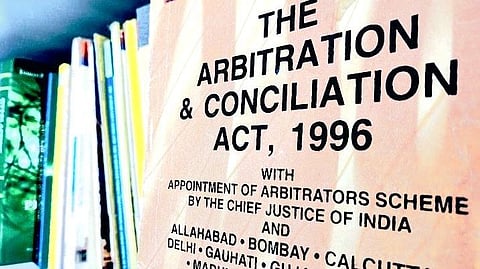
- News
- Columns
- Interviews
- Law Firms
- Apprentice Lawyer
- Legal Jobs
- हिंदी
- ಕನ್ನಡ

The Supreme Court on Friday ruled that government entities cannot insert unilateral arbitrator appointment clauses in arbitration agreements found in public-private contracts [Central Organisation for Railway Electrification v. M/s ECI SPIC SMO MCML (JV) A Joint Venture Company].
A Constitution Bench of Chief Justice of India (CJI) DY Chandrachud with Justices Hrishikesh Roy, PS Narasimha, Pankaj Mithal and Manoj Misra pronounced the verdict today.
"Unilateral appointment clauses in public private contracts are violative of Article 14 of the Constitution," ruled the majority on the Bench today.
CJI Chandrachud authored the lead opinion on behalf of himself and Justices Mithal and Misra. The CJI clarified that this ruling will apply prospectively to arbitrator appointments to be made in the future, after this judgment, and applies to three-member arbitration panels.
The verdict came in a batch of petitions dealing with the following questions of law over the appointment of arbitrators:
- Can courts deviate from the agreed procedure of appointing arbitrators on an application under Section 11 of the Arbitration Act?
- Are retired employees rendered ineligible to act as the arbitrators in cases involving their former employers?
- Can a person who is himself ineligible to be an arbitrator appoint an arbitrator?
Apart from the lead opinion, two separate opinions were authored by Justices Roy and Narasimha, in which the two judges partially disagreed on certain aspects.
All five judges, however, agreed that the principle of parity under Section 18 of the Arbitration and Conciliation Act, 1996 will apply to all stages of arbitration proceedings, including the stage of appointing arbitrators.
Highlights of majority opinion
- The Arbitration Act does not prohibit Public Service Undertakings (PSUs) from empanelling potential arbitrators. However, an arbitration clause cannot mandate the other party to select its arbitrator from the panel curated.
- A clause that allows one party to unilaterally appoint the sole arbitrator gives rise to justifiable doubts as to the independence and impartiality of the arbitrator. Further, such unilateral clause is exclusive and hinders equal participation of the other party in the appointment process of arbitrators.
- In the appointment of a three-member panel, mandating the other party to select an arbitrator from a curated panel of potential arbitrators is against the principle of equal treatment of parties. There is no effective counter-balance, because parties do not fully participate in appointing arbitrators. Such a process may be unequal and prejudiced to favor PSUs like the Railways.
- Principle of express waiver under Section 12(5) proviso of Arbitration Act also lies in situations where parties seek to waive allegations of bias against arbitrators appointed unilaterally. After such disputes arise, parties can decide whether there is necessary to waive the same.
Highlights of Justice Roy's opinion
Justice Roy said that all unilateral arbitrator appointments should not be automatically declared impermissible by courts. Unilateral appointments that adhere to the eligibility conditions mentioned in Section 12(5) of the Act should remain valid, he said.
"Arbitration Act does not per se prohibit unilateral appointment of arbitrators. If those nominated in the panel fits into the limiting factors underscored in Section 12 (5)... the same will not upset the level playing field to be provided to the arbitrating parties...An eligible arbitrator not otherwise disqualified under Schedule 7 of the Act can be appointed unilaterally and the court must refrain from imposing their own opinion, countermanding the clear intent of the parties. The statutory safeguards under the Arbitration Act provide a checklist and a counter balance and thereby rule out inequality for the arbitrating parties ... In my view, all unilateral appointments must not be declared void by way of declaration of this court."
It is only when there is a complete lack of consensus, such as when parties raise questions about the ineligibility of the arbitrator appointment under Section 12(5), that courts should intervene, he added.
Unilateral arbitrator appointments are permissible if such arbitrators are eligible under Section 12 (5), he concluded.
Justice Roy also disagreed with the majority view that principles of Constitutional law or general administrative law can be invoked to enforce the equality doctrine in the realm of arbitration.
"On this aspect, Justice Narasimha has rightly opined that public law principles evolved in Constitutional administrative law cannot generally be imported to arbitration law," Justice Roy added.
He opined that there are sufficient safeguards in the Arbitration Act to preserve the impartiality of arbitrators and a level playing field for arbitrating parties. He highlighted that courts should exercise judicial restraint at the threshold stage of appointment of arbitrators.
He added that the 2015 amendment to the Act address concerns of fairness, potential advantages to one party, and the independence and impartiality of a unilaterally appointed arbitrators.
Highlights of Justice PS Narasimha's opinion
Justice Narasimha acknowledged that unilateral appointments may raise concerns of impartiality.
"It is duty of the court to ensure the arbitration agreement inspires confidence. However unilateral appointment of arbitrator may not inspire confidence and may violate public policy requirement of constituting an impartial tribunal. Court will therefore scrutinise the agreement and hold that they may be invalid," he observed.
However, he underscored that courts should only intervene with such appointments when parties bring an application for such intervention to court.
Senior Advocates Neeraj Kishan Kaul and Gourab Banerjee, and Advocate Anirudh Krishnan appeared for the petitioners.
[Read Judgment]